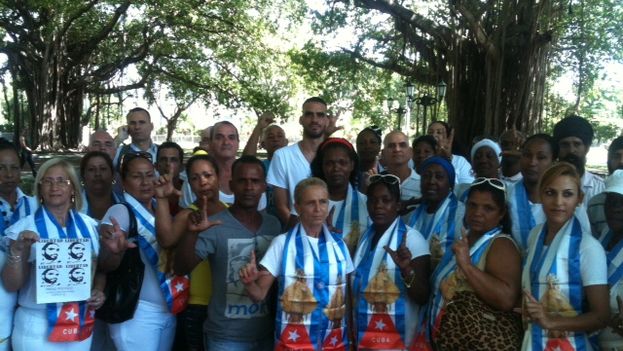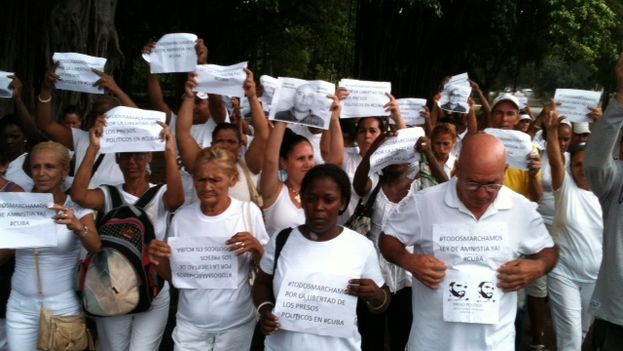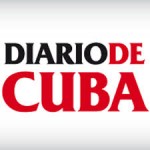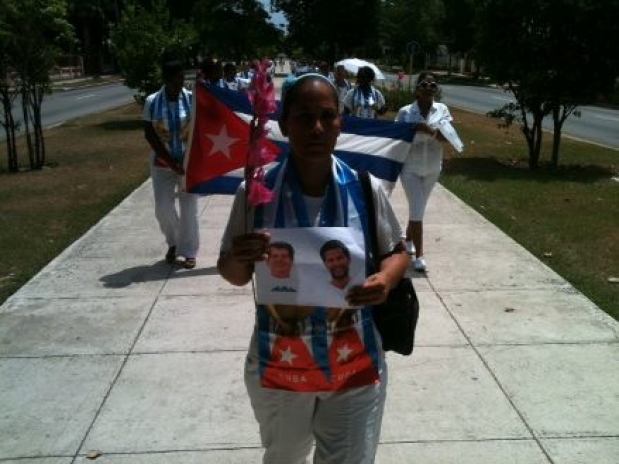Ivan Garcia, 17 September 2015 — For Nicolás Sarmientos, 73, making his usual rounds between the farm market, the bodega and the carters who sell fruits and vegetables in Havana is almost an extreme sport.
Although in theory we are knocking on the door of autumn, in Cuba the thermometers are soaring. The Meteorological Institute announced that the temperature in the capital exceeded 100 degrees, a height never reached.
Under a blazing sun and a numbing humidity, Nicolas searches the stands at the farm market for meat and beans to take home.
“The pantry and the fridge are empty,” he says, while looking at a poster of the Argentine Pope Jorge Mario Bergoglio with a Cuban flag in the background, attached to a column splattered with the red earth of the farms. continue reading
Long ago, Nicolas was a Catholic who attended Sunday mass, his children were baptized and made their first communion.
“But the world takes unexpected turns. I had to stop going to church, because I was working in a State ministry and one day a security guy told me to choose between work and religion. Now everything has changed. The Catholics can even be in the Party and we have a relationship with the Yankees. I’m waiting for a public apology from the government for making many people, like me, renounce our beliefs and customs,” he says.
Despite everything, Nicolas wants to go to Pope Francis’s first Mass in the Plaza of the Revolution on Sunday, 20 September.
Over the last 17 years, three Holy Fathers have visited the island. Since that winter in 1998 when John Paul II said that “Cuba should open itself to the world and the world open itself to Cuba,” some things have changed. But the absence of political freedoms continues, the State administer justice, controls the media and confuses democracy with loyalty to the Castro brothers.
Cuba opened itself to the world, including reestablishing relations with the United States, simply for survival. The economy is a disaster, productivity is in the toilet and the agriculture just can’t get its act together.
Fidel Castro ceded power to his brother Raul and the bragged about changes are not of the depth required to develop the country. The GDP will not grow dramatically with little family businesses that offer pizzas and bread with mayonnaise.
People, it’s true, have more space, despite the continued violation of the inalienable rights of free people. With enough money you can buy cell phone service, stay in a five star hotel or travel abroad.
But the Castro regime maintains an iron blockade on citizen initiatives, economic investments and political rights. The role of the Catholic Church, and the rest of the various religious denominations, has been uneven.
On January 1st, the Yoruba Association of Cuba — 70% of the island’s population practices Afrocuban worship — in its Annual Letter predicted important changes. And the following morning performed a rite under a hundred-year-old ceiba tree for the health of the dictator Fidel Castro.
In pursuit of greater social space, the Catholic Church works with the engine on low. Pastoral letters that dissect the terrible inertia of the society, like “Love can do everything” in 1993, and outspoken bishops, such as the late Pedro Meurice or Jose Conrado, are contrasted with the sinuous strategy of Cardinal Jaime Ortega.
The Cuban dissidence will be forever grateful to Ortega for his mediation with General Raul Castro for the release of the 75 political prisoners in 2010. Probably under the table and without publicity, the national Church asks the regime’s repressors for restraint, the repressors who, every Sunday, beat up dissidents in Miramar, a neighborhood to the west of Havana.
Just ask Berta Soler or Angel Moya about the brutal repression they suffer for demanding democracy and freedom for 60 political prisoners.
“There have now been 22 consecutive Sundays of savage beatings of women and men when we are protesting in a peaceful manner. Last weekend they arrested 34 Ladies in White and 17 men. Berta (Soler) asked for a meeting with Pope Francis to describe the repression first hand. So far the Church has not responded,” said Angel Moya, one of the leaders, along with Antonio Rodiles of the Forum for Rights and Freedoms.
The dissidence asked the Catholic Church for greater support in the struggle for democracy. Moya thinks that “we need the solidarity of all the people and institutions who want a better country. If something has emboldened the regime it is the silence of the Catholic Church and the foreign press.”
And he asks the Pope to take note of the presidential pardon of 3,533 common prisoners. “In prison there are still about 60 prisoners for political purposes, some of them with more than 20 years in prison. This pardon is a typical maneuver to comply with certain formalities before the papal visit. Many of the pardoned could be used as shock troops to repress the opposition,” says Angel Moya.
The systematic beatings of the Ladies in White by the government special services contradicts the campaign against gender violence waged by the United Nations, of which Cuba is a member.
The dissidence just demands a legal space and respect. Within 72 hours of the third visit of a pope to the island, ordinary Cubans will continue their daily effort for survival.
The retiree Nicolas Sarmientos, a devout Catholic, wanders the markets in search of food for his family. Berta Soler and one hundred Ladies in White and dissidents demand democracy in the streets. It remains to be seen if Pope Bergoglio listens.

![]() 14ymedio, Havana, 25 October 2016 — The artist Danilo Maldonado, ‘El Sexto’ (The Sixth), joined 48 Ladies in White during their traditional walk down Fifth Avenue in Havana this Sunday. Released last week after ten months in prison, the graffiti artist accompanied the women and about twenty activists who gathered outside after mass at Santa Rita Church.
14ymedio, Havana, 25 October 2016 — The artist Danilo Maldonado, ‘El Sexto’ (The Sixth), joined 48 Ladies in White during their traditional walk down Fifth Avenue in Havana this Sunday. Released last week after ten months in prison, the graffiti artist accompanied the women and about twenty activists who gathered outside after mass at Santa Rita Church.



